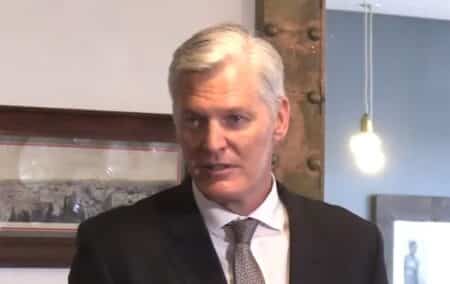A white man, Andre de Ruyter, was appointed CEO of Eskom in January 2020. And guess what? He has been accused of ‘racism’ by a black man, the suspended Chief Procurement Officer of Eskom, Solly Tshitangano.
The matter is being investigated by Eskom, with politicians and commentators brooding and muttering in the background.
This immediately divides South Africa into two camps. One says, ‘De Ruyter is white; therefore he must be a racist.’ The other says, ‘Tshitangano is black; therefore he must be corrupt.’
An editorial in The Star (proprietor: Iqbal Surve) expresses the first view. ‘He (De Ruyter) is clearly an unapologetic one-man show determined to collapse Eskom and privatise it, hence any efforts to make Eskom functional again are reserved by De Ruyter and his hired all-white old boys’ club.’
I suppose De Ruyter will also be accused of ‘white monopoly capital’. The second camp seldom goes to print but whispers loudly and widely. ‘Blacks are corrupt and wreck everything, and then blame it on white racism. Eskom was a world-class utility until the blacks took over’. Both views are cancerous.
De Ruyter was brave in taking on an awful job. He is doing well in trying to pull Eskom out of the terrible hole it has dug itself into. Let me deal with his faults first, which are separate from this sorry affair. He does not seem to understand the nature of a state electricity utility, which has the obligation to supply. This makes it different from a private company, whose aim is to make profits.
‘Four Ds’
In an otherwise good address to the Free Market Foundation, he spoke about the ‘four Ds’ of modern electricity supply. Two of these were: 1. De-carbonisation. Oh, dear! He swallows the unscientific rubbish that carbon dioxide is bad. It isn’t. It’s good. It’s having little or no effect on the climate, and is benefiting plant life. 2. De-centralisation. By this, I presume he means having a lot of wind turbines and solar arrays all over the place. But this is not de-centralisation, since they all have to be linked together over vast distances by a highly centralised grid controller. Furthermore, he is wrong to think that solar and wind for the grid can ever be other than expensive and unreliable. He is wrong to think we must move away from a ‘vertically integrated’ supply system. Eskom worked well under such a system, and could do so now, if properly managed.
However, he has been good at identifying the immediate problems of Eskom. The first is the unreliability of the coal stations, which break down too often. He has instituted a formal maintenance programme, which means taking machines offline for essential repairs. The second is to make procurement, especially of coal – a massive expense for Eskom – more economic and efficient. I think it is here he has probably run into trouble. The deep problem is the overlap between legal corruption (BEE) and illegal corruption (Gupta deals).
BEE (Black Economic Enrichment – sorry! Empowerment) means giving bribes and jobs to rich politically connected blacks. If you give the job to a poor black man with no political connections, you will be arrested for ‘fronting’. A typical big Eskom coal station uses about 16 million tons of coal a year. This is too much to be transported over long distances. In the old days, the coal station was built next to the coal field, the coal was mined by one of the big majors, such as Anglo, and delivered on a conveyor belt to the power station. An excellent arrangement, which delivered cheap coal of consistent quality to the station, while minimising environmental damage. This was changed after 1994.
Blackouts increased
Instead, coal procurement went out to BEE suppliers, with small mines all over Mpumalanga, producing poor and inconsistent coal, which was delivered by road trucks, wrecking the roads and the environment. The coal suppliers were chosen not on the price or quality of the coal but on the race, gender and size of the supplier. First was a small black female supplier, then a small black male supplier – and so on, with a big white male supplier (such as Anglo or Glencore) coming last. The result was that the cost of coal to Eskom soared into the stratosphere, coal power station blackouts increased because of the bad coal they were getting (climaxing in January 2008, when multiple power stations failed and the gold mines had to be shut down), and BEE suppliers made a fortune. All of this was legal, since BEE is the law of the land.
To reduce unnecessary costs to Eskom and to reduce its appalling debt, De Ruyter must get better procurement at lower prices. But this will upset a whole patronage network of BEE deals.
I don’t think the ANC will allow him to do so. He might not be allowed to do anything that will improve Eskom’s finances. He might be fired for trying to do so.
The views of the writer are not necessarily the views of the Daily Friend or the IRR
If you like what you have just read, support the Daily Friend

